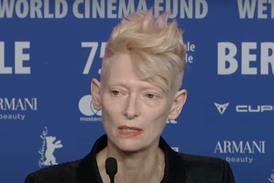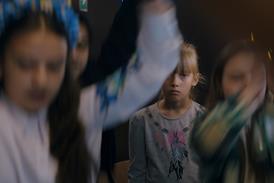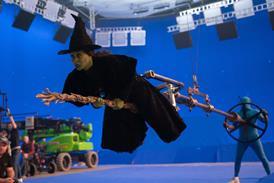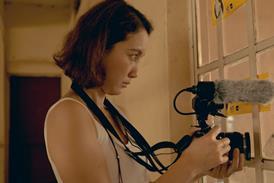Sensitive portrait of a marriage under strain in Jerusalem’s Hasidic Jewish community

Dir: Nir Bergman. Israel. 2024. 106mins
A young wife and mother of three, Bati (Nur Fibak) has a seemingly blessed life within the close-knit ultra-Orthodox Jewish community of Jerusalem. But, in Nir Bergman’s sensitive, intimately observed domestic drama, Bati’s comfortable certainties are overturned when she learns that her husband Lazer (Uri Blufarb) has fallen victim to blackmail over intimate photos that link him romantically with a male study partner. Determined to save her marriage and her man, Bati overcomes her modesty in order to tempt Lazer back into the marital bed. But ultimately, she learns more about her own needs than those of her husband.
A woman’s eye view on the taboo subject of gay male relationships in the Hasidic community.
Pink Lady is Bergman’s follow up to his terrific 2020 father and autistic son road trip, Here We Are, which was named as part of the Covid-cancelled Cannes Official Selection of that year and went on to earn a respectable haul of Israeli Film Academy Awards. This film, which shares thematic territory with Haim Tabakman’s 2009 drama Eyes Wide Open, offers a fresh perspective: a woman’s eye view on the taboo subject of gay male relationships in the Hasidic community. It’s restrained in its approach rather than stylistically assertive or formally daring, and the use of music can feel rather heavy-handed. But overall this is a quality picture, with the perceptive screenplay by Mindi Ehrlich, who was raised within Jerusalem’s Orthodox community, a key stand out.
It’s a tricky market for Israeli cinema right now, even for liberal, thoughtful pictures such as this one, so Pink Lady’s journey following its premiere in competition in Tallinn is uncertain. But at the very least, the film should find further festival interest, particularly with female-focused and LGBTQ+-themed events.
Erlich’s insightful screenplay is as much about what isn’t said as what is. As a married woman with a clutch of kids, it might be assumed that Bati would have achieved a degree of worldliness by now. But in fact, certain topics — anything to do with sex or fertility — have been ring-fenced and excluded from conversation. Bati works at the local Mikvah, the communal bath where Orthodox women must perform a ritual immersion each month to purify themselves after menstruation. But even the subject of periods is something that Bati tiptoes coyly around, employing a code of initials, meaningfully raised eyebrows and flustered ambiguity to address the subject.
With discussion of marital sexual relations well and truly off the table, Bati has nothing to which to compare this aspect of her marriage – although she does notice, with a degree of disquiet, the doting adoration and attentiveness of the husband of her newly-married younger sister.
The shocking news about Lazer jolts the whole film; for a while at least, it seems as though this gentle, naturalistic drama is about to morph into a thriller. Thugs bang at the door of Bati’s apartment, and Lazer is battered and shaken by an assault. But while the marriage is at the heart of the story, it is through Bati’s relationships with other women that she starts to grow as a person.
The mothers of Bati and Lazer clearly have little love lost between them, but they form a temporary amnesty to interfere in the marriage of their children. Bergman taps into humour in scenes with the meddling matriarchs: a moment of synchronised arm-crossing disapproval from the grannies at the risqué suggestion of scarlet underwear is nicely judged, and offers levity that contrasts with the anguish of Lazer’s faith-based conversion therapy.
But it’s Bati’s friendship with Natalie (Gal Malka), a woman from outside of the Orthodox community, that changes her world view. They meet when Bati takes pity on Natalie and performs the ritual Mikvah bath, even though Natalie has been unable to remove her gel nail polish, which, Bati explains gravely, will act as a buffer between her and cleansing powers of the waters. She warns Natalie that, if she should fall pregnant, “it will be an impure baby.” Natalie, who is just going through with the ritual to humour her newly-observant boyfriend, cackles derisively. But over several meetings, a friendship grows, and Natalie’s liberated spirit encourages Bati to look finally beyond her closed world.
Production company: 2-Team Productions, Rosamont
International sales: mK2 Films intlsales@mk2.com
Producers: Haim Mecklberg, Estee Yacov-Mecklberg, Marica Stocchi
Screenplay: Mindi Ehrlich
Cinematography: Shai Goldman
Editing: Or Lee-Tal
Production design: Yaara Barzel
Music: Matteo Curallo
Main cast: Nur Fibak, Uri Blufarb, Sara von Schwarze, Michal Weinberg, Gal Malka
























